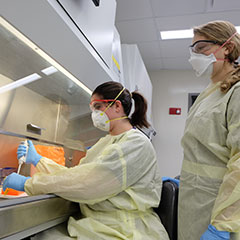January 15, 2019
Transboundary animal disease training at the Biosecurity Research Institute; new opportunities open

A group of Kansas State University students recently completed the Transboundary Animal Disease, or TAD, Fellowship Program at the Biosecurity Research Institute. With completion of the program by these students, the program is now seeking new applicants.
Kansas State University is helping to confront diseases through this research fellowship program, which leverages the expertise and resources of the Biosecurity Research Institute and the diagnostic medicine and pathobiology department in the College of Veterinary Medicine to train next generation of doctoral, Doctor of Veterinary Medicine, master's, Master of Public Health and postdoctoral researchers to work in high and maximum-containment environments on a variety of transboundary animal diseases.
"Our objective was to train and support graduate-degree-seeking individuals, or individuals who are just beginning their postgraduate careers," said Dana Vanlandingham, associate professor of virology in the diagnostic medicine and pathobiology department. "At this point, we have completed training of two cohorts of students who have continued their research on TADs, which are important to agriculture."
Christian Cook, a second-year doctoral student from the College of Veterinary Medicine, said she believes participating in the TAD fellowship was a unique opportunity that provided knowledge on the agricultural pathogens that have huge impacts both nationally and globally.
"Receiving hands-on training on how to work with these agents in high-containment laboratories is critical to developing the expertise necessary for the diagnosis and research of foreign animal diseases," Cook said.
Since completing the TAD fellowship, Cook has been awarded a National Bio and Agro-defense Facility Scientist Training Program fellowship. Through the fellowship, she is committed to working at the Foreign Animal Disease Diagnostic Laboratory at NBAF.
Rachel Palinski accepted a postdoctoral fellow position in the spring of 2018 with the USDA Agricultural Research Service. She is currently working at Plum Island Animal Disease Center, or PIADC, in New York.
"As a TAD fellow, I was able to learn and network in ways that helped me obtain a postdoctoral fellow position at the Plum Island Animal Disease Center," Palinski said. "Working at PIADC requires an in-depth knowledge of BSL-3 animal and laboratory practices along with knowledge of the agents themselves. The information of the agents can be learned easily through research of published papers, however, learning BSL-3 animal and laboratory practices requires a more hands-on approach. In addition to the BSL-3 practices provided by the fellowship, the networking opportunities were the key to my successful acceptance of the postdoctoral fellow position. I cannot say enough good things about the TAD fellowship."
Victoria Ayers is currently a third-year doctoral student in diagnostic medicine and pathobiology. She was accepted into the TAD fellowship soon after beginning her graduate studies. Ayers was accepted into the USDA APHIS NBAF Scientist Training Program and is looking forward to working at NBAF and with the scientists from Plum Island Animal Disease Center after she graduates with her doctorate.
Laura Constance has been working on her doctorate while completing TAD fellowship training. Her graduate studies involve working with transboundary swine diseases at the Biosecurity Research Institute.
"I have had the opportunity to interact with people at different high-biocontainment facilities working in many different positions," Constance said. "Additionally, this year I was accepted into the NBAF Training Scientist Program. This will allow me to finish up both my doctorate and Doctor of Veterinary Medicine degrees and obtain a job with the USDA after I graduate. I will be working at the Plum Island Animal Disease Center and eventually at the new NBAF facility. The opportunities the TAD fellowship have opened up for me have been immense and I appreciate everyone who has been involved in this process to get me where I am today."
New TAD Workforce Development opportunities are now being offered for summer 2019 and an optional fall 2019 term. Benefits include a summer stipend of $8,000 and an optional fall stipend of $3,000. Tuition assistance of up to $4,000 is offered for core courses in the agricultural biosecurity research graduate certificate program. Applicants must enroll and be accepted into the agricultural biosecurity research graduate certificate program at Kansas State University and hold U.S. citizenship.
Complete application requirements and details are posted online. Priority consideration will be given to application packets received on or before 11:59 p.m. central time on Friday, Feb. 15.
